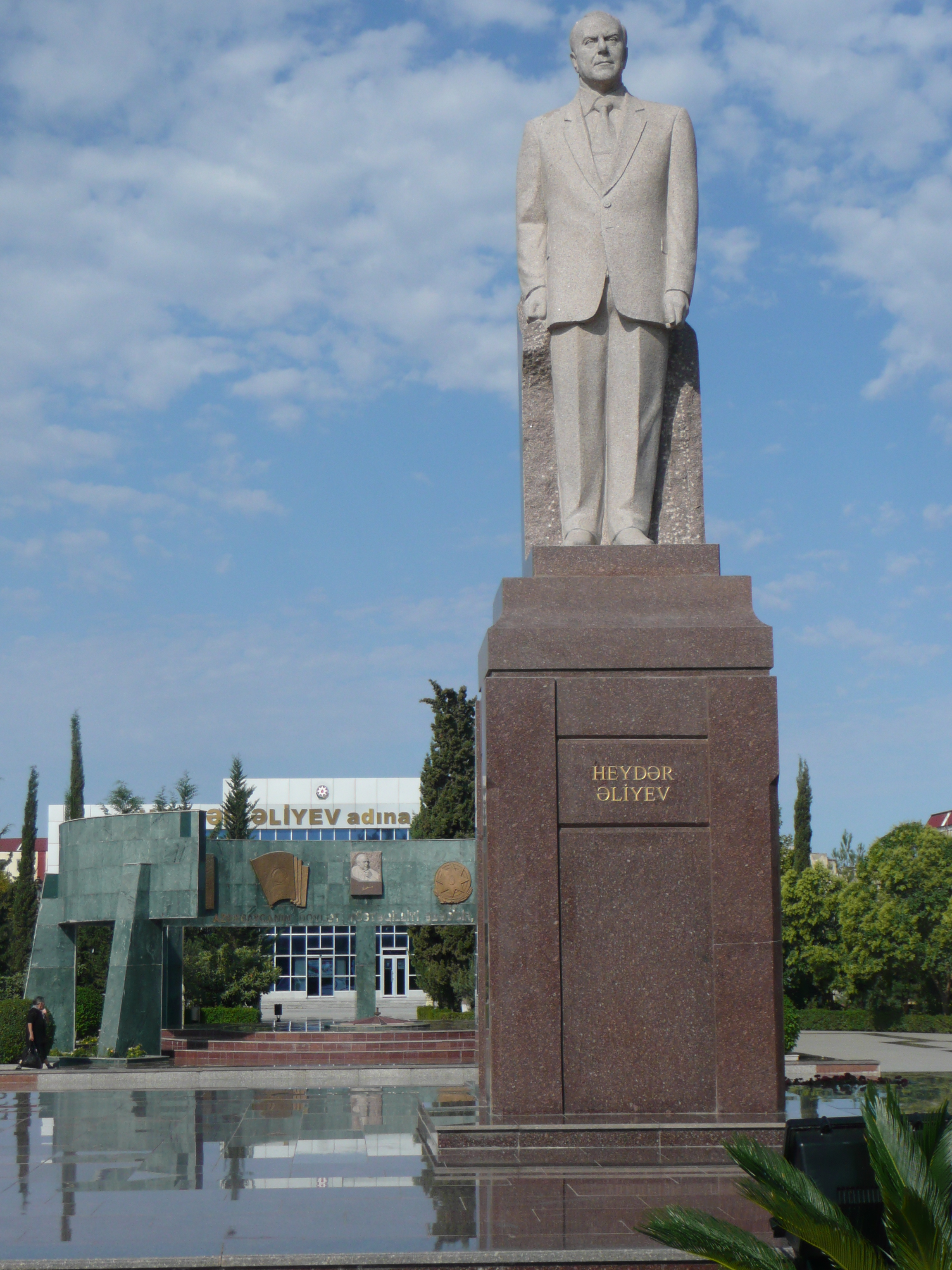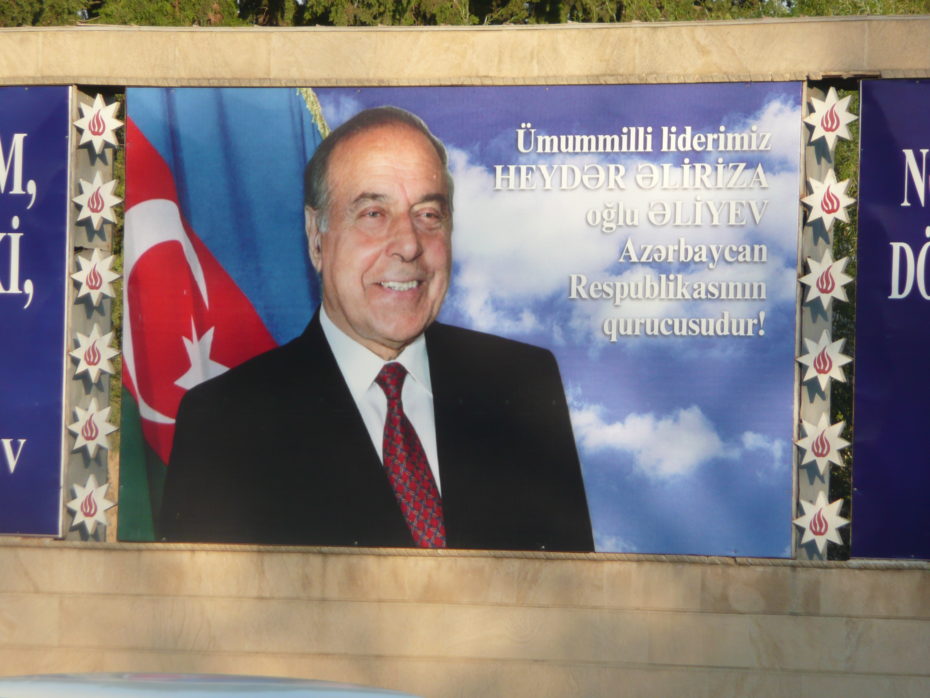If there was ever a total give away that you were in a dictatorship, it’s the profusion of huge images of one man around every town. If it’s a woman, it’s not a dictatorship. The twist here is that the images are of Heydar Aliyev, the deceased father of current president Ilham, as if his divine grace bestows legitimacy to the son. Although neither of them are up to Saddam Hussein’s standards you can be sure that none of those pesky elections will unseat him from the presidency. Conveniently since writing those lines there has indeed been an election and of course he won and independent monitors confirmed it as neither free nor fair. In fact he had already ordered the flowers for the victory celebration beforehand.
Despite critic’s imprisonment on trumped-up charges and the predictable litany of corruption, torture and controls on protest required by any self-respecting dictator, Aliyev has a fair measure of popularity. This is easily explained by the abundance of oil money which certainly provides construction work building monuments to his father. Every town has several streets, parks, buildings, even museums named after him. The avuncular image of Heydar is portrayed as a father of the nation figure, usually accompanied by his words of wisdom. Beyond helping to stabilise the country after the war with Armenia in the early 90’s it’s difficult to see what he would have offered the country, apart from the usual post Soviet tyranny without oil money to buy allegiance.

Heydar Aliyev statue in Heydar Aliyev park on Heydar Aliyev St with Heydar Aliyev building behind (yes really)
The other big advantage of oil is that it buys you all the friends you need in the West, like UK trade envoy the Duke of York with whom Ilham is very chummy and EU president Barroso, who praised the country’s progress on human rights??? If any of us made an error of judgement as huge as mistaking a dictator for a jolly decent chap, despite all evidence to the contrary we would be sacked in an instant. So, along with David Cameron’s arms sales tour of the world’s despots, dissidents can soon look forward to a firm poke with British made cattle prods, whilst restrained with our hand cuffs and with any luck a good lungful of our tear gas.
It won’t come as a surprise to know that it’s not a good country to be gay in, despite the fact that a low-key gay pride celebration did take place recently: possibly the first in an Islamic country. Given that a week later an openly gay man was found murdered gives you a fairly clear indication of the situation. Homosexual relations may have been decriminalised but this doesn’t equate in genuine protection.
As you will have gathered from my last post and writings on Iran there is an inverse relationship between democracy and friendliness, an equation supported by my visits to pre war Syria and many African countries of dubious governance. Are all these countries just home to people naturally open to foreigners or perhaps, in some measure it’s the population wishing to demonstrate that they are not defined by their rulers. Your thoughts please.






Another excellent piece Graham. I always enjoy your writing, the observation and comment you make.
As I’m hoping to travel through central Asia, once I’m done with Africa, sometime late 2014/ 2015, I’m also finding my appetite whetted.
On this occasion you’ve raised a question, which can be paraphrased, “are people who live in countries under oppressive regimes generally friendlier?”
Like you I’ve been to Syria. In 2009 I travelled extensively there. With one exception, in thousands of interactions, I was blown away by the welcome and hospitality I received there. It’s the friendliest country I’ve visited thus far.
I’ve also travelled in other despotic Arab states and early post Soviet Ukraine, but I’ve generally not experienced the unconditional hospitality that I found in Syria, where being offered a meal in a stranger’s home is an everyday occurrence. This is something you appear to have also found in your recent travels.
So while instinctively upon reading your piece I nodded along, now I’ve given it some more thought I differ a little.
I feel there are other factors at play that lead to great hospitality: geography and affluence (or lack thereof).
Geography plays a part in Syria and I suspect central Asia which both fall on the old Silk Road, with Damascus in addition a gathering hub for the old Haj caravans. The centuries of trade and welcoming of peoples from foreign lands has engendered a culture whereby the ‘weary traveller’ is befriended and hospitality extended.
In the desert its inhospitable geographic circumstances, give rise to the custom of the Bedouin, where a stranger is given free food and a bed in the tent for up to three days without so much as a question about their journey or intentions. This is something I experienced at a Wadi as recently as 2007.
As travellers, people who get out there and experience and connect with different environments, I’m sure we have tales of humbling generosity in areas of poverty, or relative poverty. As well as the aforementioned countries, I can think of being overwhelmed by the kindness of strangers in Ireland Scotland, the US to name but a few places.
Gope you don’t mind my contribution and my slightly contrarian view?
Keep writing, its brilliant thought provoking stuff.
Jack
I think your expansion on the geography-trade idea is a good one and of course a good welcome can be found anywhere (apart from central Dakar) but for me the true test is where the language barrier does not hinder the interaction. I still think Islam plays an important role in this as it cannot be a coincidence that many travelers have spoken of the welcome in the countries that we have (Syria, Iran, Central Asia) all of which are largely Islamic. The subject deserves more than one blog post and after covering more of the world I will return to it and look forward to hearing other travelers experiences. Even the simple transition from towns to isolated/rural communities in many countries displays an increase in the welcome. Keep the thoughts coming – particularly after more of your time in Africa, where I feel there is a definite, but different sense of hospitality.
Pingback: My Ignorance | Frustrated Self